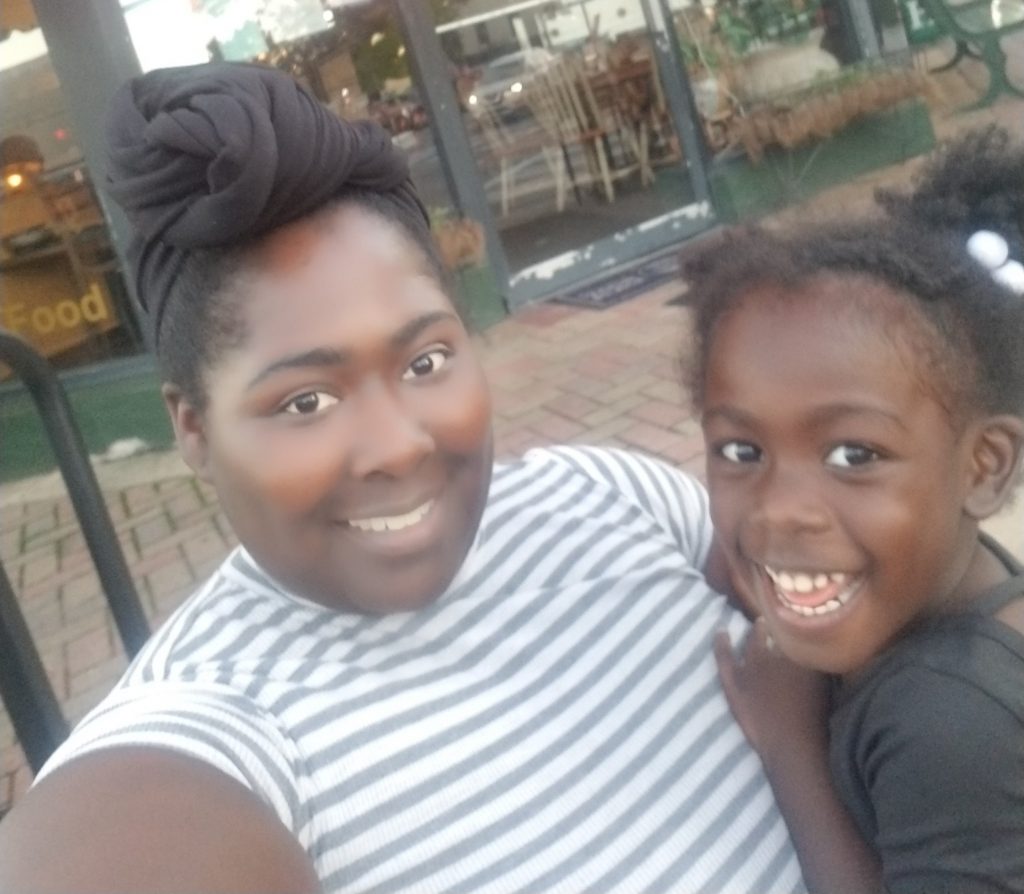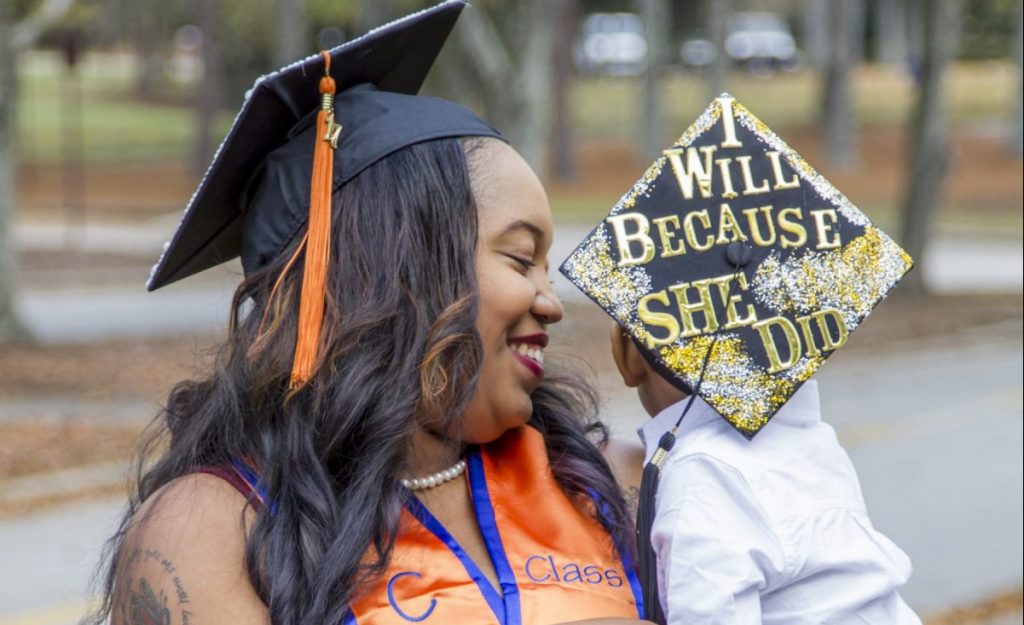As Adults Return To College, Schools Try To Remove Barriers

Brittany Marks is congratulated by her son, Bryce, on her graduation from Clayton State University. She credits the Boost program for helping her finish her degree. It subsidizes childcare for low-income parents who’ve returned to college full time. It also helps parents find high-quality childcare centers for their children.
Courtesy of Brittany Marks
The image of a ‘traditional’ college student—a fresh-faced teenager living on campus—may be changing.
Increasingly, schools are reaching out to ‘non-traditional’ students. They tend to be older, live off-campus, and may have other responsibilities like full-time jobs or children. More than 15 percent of students enrolled in The University System of Georgia this fall are non-traditional students.
Meeting the Goal
Some states, like Georgia, are turning their attention to non-traditional students because they’ve set some lofty goals for college completion. Complete College Georgia is a plan outlined by the state that aims to ensure 60 percent of the state’s adults will have some kind of post-secondary degree by the year 2025. Right now, about 42 percent of adults in the state meet that criterion.
Tom Harnisch, the director of state relations and policy analysis for the American Association of State Colleges and Universities, said schools can’t count on younger students to close the gap.
“Adults have to be part of the equation,” Harnisch said. “The math just doesn’t work. There’s just not enough traditional-age students out there for states to educate that will help them reach those ambitious attainment goals.”
To attract non-traditional students, Harnisch said colleges are trying to make it easier to return to school.
“[Colleges have] identified those barriers–from navigating the enrollment and financial aid processes to child care to having courses that fit their schedule—and they’ve worked to try to remove those barriers to help students finish their college degrees,” Harnisch says.
Getting a ‘Boost’
Genesis Appiah is a 31-year-old single mom who returned to college full time last year. She’s working toward a psychology degree at Clayton State University. Appiah has attended college on and off since graduating from high school. She’s been able to find work, even landing at the Georgia Department of Labor for a while. But Appiah says she felt replaceable because she didn’t have a four-year degree.
“When you don’t have this foundation of a college degree, there’s no stability,” she says. “You don’t have the tools to be marketable necessarily.”
When she returned to school, Appiah said the challenges of juggling caring for her 3-year-old daughter and taking a full course load took their toll.
“It was completely overwhelming,” she said. “Being over 30, and starting college again, when my classmates … they don’t have a 2-year-old crying in the back when they’re trying to do their homework.”

Not long after starting school, Appiah heard about a program called Boost. It’s a collaboration between Clayton State, Columbus State, Georgia Southern, and childcare nonprofit Quality Care for Children. Savannah State will soon join the program. Boost subsidizes childcare for low-income parents who’ve returned to college full time. It also helps parents find high-quality childcare centers for their children.
Appiah received help through the Boost program. She says her daughter loves the preschool she attends now, and Appiah doesn’t have to worry about cost.
“It’s kind of like a dream come true,” she said. “I couldn’t ask for anything better.”
Psychology professor Deborah Deckner-Davis helped bring the Boost program to Clayton State. She says when she started teaching at Clayton State, she noticed a lot of her students were also parents. Nationally, about a third of low-income students who are parents graduate from college within six years.
“So, we’re really looking at, ‘well, if you help them take care of their kids, does that boost that graduation rate?’” she says. “And does it kind of change that trajectory? And so that’s how we got involved.”
Deckner-Davis says the program provides support, but it doesn’t solve everything.
“It’s not as if it eradicates all the complications in their lives, because being a student is hard in and of itself, and being a parent is hard in and of itself,” she said. “So I don’t want to suggest that this is some sort of fairy tale scenario. They’re still working very hard.”
Crossing the Finish Line
Brittany Marks credits the Boost program with helping her graduate. She finished a communications degree at Clayton State in December 2017.
“Before the program, it was a lot more stress,” Marks says. “I had to give plasma regularly.”
Marks sold her plasma to get money for school and childcare. Like Appiah, she attended college on and off since high school. When she enrolled in Clayton State in 2016, she struggled to afford childcare for her son.

“I was constantly trying to figure out, ‘How can I provide for my son?’ and things like that,” she said.
Then, a professor referred her to the Boost program. The scholarship paid for her son’s daycare and the program helped her find a preschool for him she really liked.
“We built a relationship,” she says. “So, they knew me. They knew what I liked and didn’t like, and how to approach me with things with my son.”
She liked it so much that she kept her son there for Pre-Kindergarten this year. Marks had such a good experience that she became a parent ambassador for the state’s Quality Rated program, which evaluates childcare programs.
“Boost gave me somebody else on my side,” Marks says.
The Boost initiative is privately funded. Georgia is one of a handful of states that doesn’t provide childcare assistance for low-income parents enrolled in college.
Georgia colleges offer other incentives for non-traditional students. The state’s ‘Go Back, Move Ahead’ program offers college course credit for some job or military experience. Most schools offer online courses, and some are adding more advisors to make sure students stay on track and graduate.








